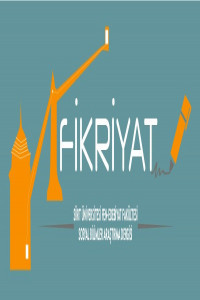GELECEKTE TARİH ÖĞRETMENLERİNİN DİJİTAL TEKNOLOJİLERE DAYALI ARAŞTIRMA YETERLİLİKLERİNİN OLUŞUMU
Özet
Makalenin konusu, dijital dönüşüm ve tarihsel kaynakların kitlesel sayısallaştırılması bağlamında tarih biliminin gelişimi ile ilgili modern zorluklar ve problemlerdir.
Tarihsel bilişim ile dijital kamusal tarih de dahil olmak üzere "dijitaltarih" arasındaki ilişki ayrıntılı olarak analiz edilir. Son yıllarda yeni bir ivme kazanan verilerin geleneksel tarihsel bilgisayar bilimi sorunlarına özel bir yer verilmektedir. "Büyükveri" nin genişletilmiş tanımı ve tarihsel araştırmalarla ilgili özellikleri, bir dizi büyük ölçekli uluslararası araştırma projesi örneğinde tartışılmaktadır.
Araştırmanın metodolojisi, dijital dönüş bağlamında modern tarihsel bilim gelişim süreçlerinin incelenmesine yönelik sistematik, bilgilendirici ve disiplinlerarası yaklaşımlara dayanmaktadır.
Makalenin bilimsel yeniliği, tarihsel bilişim ve dijital tarihin konu alanlarının korelasyonunun belirlenmesi, tarihsel yönelimli araştırma projelerinde "büyükveri" kavram ve teknolojilerinin kullanılma olanaklarının belirlenmesi, matematiksel yöntemlerin ve dijital teknolojilerin gelecek vaateden uygulama alanlarının belirlenmesi gibi yönlerde yatmaktadır tarihsel araştırma ve eğitim programları.
Modern nesil dijital dünyada doğar. Hayatta dijital teknolojilerin kullanımını hafife alıyorlar. Öğrenme sürecinde, dijital yeterlilikleri yalnızca geliştirilmektedir. Ancak özel eğitim ihtiyacı olanların her zaman dijital yetkinlikleri yoktur. Sorun şu ki, dijital yetkinlikler olmadan entelektüel gelişim bozukluğu olan çocuklar dijital bir topluma entegre olamayacaktır.
The subject of the article is modern challenges and problems related to the development of historical science in the context of the digital turn and the mass digitization of historical sources.
The correlation of historical informatics and "digital history", including digital public history, is analyzed in detail. A special place is given to the traditional historical computer science problems of data, which have received a new impetus in recent years. The extended definition of "big data" and its specifics in relation to historical research are discussed on the example of a number of large-scale international research projects.
The methodology of the research is based on systematic, informational and interdisciplinary approaches to the study of modern processes of historical science development in the context of the digital turn.
The scientific novelty of the article lies in such aspects as determining the correlation of the subject fields of historical informatics and digital history, determining the possibilities of using concepts and technologies of "big data" in historically-oriented research projects, identifying promising areas of application of mathematical methods and digital technologies in historical research and educational programs.
The modern generation is born in the digital world. They take the use of digital technologies in life for granted. In the process of learning, their digital competencies are only being improved. However, those with special educational needs do not always have digital competencies. The problem is that without digital competencies, children with intellectual development disorders will not be able to integrate into a digital society.
FORMATION OF RESEARCH COMPETENCE OF FUTURE TEACHERS OF HISTORIANS BASED ON DIGITAL TECHNOLOGIES
___
- Lukashenko, S. N. (2015).The model of higher school students’ research competence in multilevel training (taking as the example the mathematical disciplines studies). The Education and science journal, (1), 73-85.
- Fedina O.V. Features of the methodology for the formation of research competencies of junior physics students at a laboratory workshop // Modern problems of humanities and natural sciences: materials of the fifth International scientific and practical conference. – Moscow: Institute for Strategic Studies, 2010.
- Moldabekova M.S. and Akzholova A.A. (2015). Development of research competence of students in history in solving professional problems // Herald. Series "Physical and mathematical sciences", 3(51).178-183.
Soldatova, G. U. (2018). Digital socialization in the cultural-historical paradigm: a changing child in a changing world. G. U. Soldatova, 3(9). 71-80.
- Yakovleva, E. V. (2020). Digital competence: approaches to the definition of the concept, Pedagogical education and science, 6.
Stephanie, C. G., Riina, V., & Yves, P. (2017). DigComp 2.1: The Digital Competence Framework for Citizens with eight proficiency levels and examples of use.
